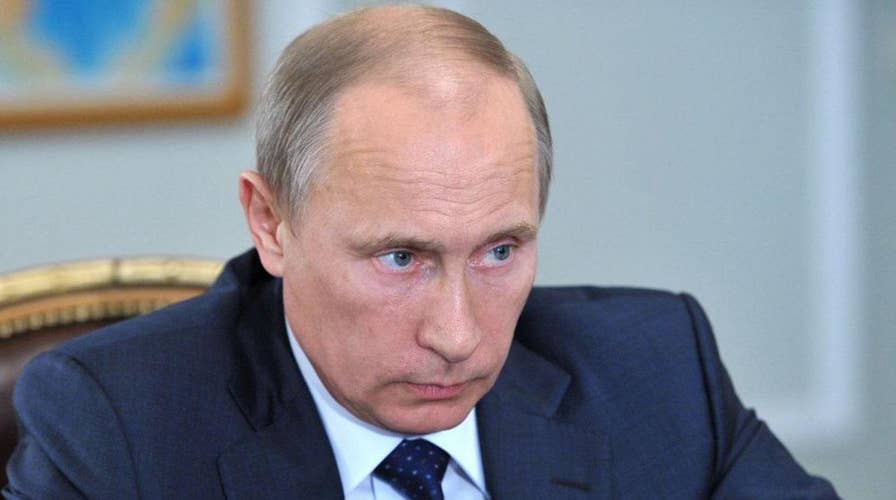Putin visits Syria, announces partial troop withdrawal
Benjamin Hall reports on global skepticism over Russia leader's perceived withdrawal from Middle East.
Vladimir Putin is a master at manipulating people by telling them what they want to hear. He's just done it again by announcing a "withdrawal" from Syria while simply resetting his forces there and promoting Russian-led “peace talks” between Bashar al-Assad and regime-tolerated Syrian rebel groups.
Putin has no intention of going anywhere. He has established strong military positions in Syria—an airbase near Latakia and a naval port at Tartus—with 49-year leases. But the most dangerous aspect of the illusion he fosters is that he could split from Iran in Syria in a way that helps the U.S. contain Russia’s partner in propping up the Assad dictatorship.
This is a pipe dream with growing appeal to U.S. policymakers, who sidelined themselves in Syria, apart from the fight against ISIS, starting with the Obama Administration. The fact is that if the U.S. wants to contain Iran’s growing Syrian footprint, counting on Putin isn't the way to do it.
It's going to be hard to get the Iranians out: they are entrenching themselves in Damascus (where Iran has been buying property for years), southern Syria, Aleppo, and elsewhere. Iran’s Islamic Revolutionary Guards Corps (IRGC) and its auxiliaries are spread all over the country.
The Obama Administration did nothing to block the Russian military presence in Syria, and the Trump Administration followed suit. But the Trump White House has repeatedly refused—at least rhetorically-- to accept a permanent Iranian military presence there. With good reason: allowing Iran to keep bases in Syria would make a recently-released U.S. containment strategy for Iran nearly meaningless.
The U.S. has negotiated "de-escalation zones" in Syria with Russia, which theoretically require Iranian forces to withdraw. For the most part, they haven’t.
The U.S. has negotiated "de-escalation zones" in Syria with Russia, which theoretically require Iranian forces to withdraw. For the most part, they haven’t. U.S. officials have offered no indication they actually plan to do anything substantive to reduce Tehran’s presence.
The idea is now growing that Russia and Iran could “split” in Syria after the declared “defeat” of ISIS, and that Putin could then help contain Tehran’s aggressive activity. But how, concretely, could Putin do that?
One idea, especially in the wake of Putin’s “retrenchment,” is that he could withhold air support to Iranian forces in Syria to cause a pullback. Indeed, Putin may be withholding Russian military support for Iranian operations in Syria’s northerly Idlib Province right now.
Tehran, however, has a much stronger hand to play in threatening to withhold military assistance than Putin does— the Iranian coalition defends Russia's bases at Tartus and Latakia. If he makes Iran his enemy in Syria he will lose everything he's fought for there.
In fact, Iranian military force, not Russian, is dominant in Syria. Moscow’s military contingent consists of a few thousand personnel devoted to securing bases and supporting air operations, along with a very limited number of special forces (SPETSNAZ) and military police, as well as some private contractors. Russia has developed some of its own Syrian proxy forces, but their numbers are small.
Iran, by contrast, commands a coalition of many tens of thousands of fighters—its own Revolutionary Guards, Qods Force, and Basij fighters; Lebanese Hezbollah; Iraqi Shi'a militias (now pouring into Syria after the recapture of Mosul); and thousands of Afghans and Pakistanis it has recruited, trained, and brought into the Levant.
That coalition force is by far the most powerful single military organization in Syria. It can and will dictate realities on the ground in matters of any great importance to Tehran.
As things stand, Putin now tolerates Israeli attacks on Iranian positions in Syria that his air defenses and air force could have resisted and possibly deterred. Some analysts argue that this divergence opens the door for Israel to contain Iran in Syria with tacit Russian permission.
But Israeli strikes have so far been pin-pricks aimed mainly at installations reportedly involved in chemical weapons, missile systems, and other advanced Iranian technologies, rather than changing the Iranian footprint in Syria overall. To change Iran’s posture, Israel would have to undertake a large-scale air campaign and probably a ground campaign into Syria as well—something akin to a full-scale war with Iran and its proxies.
Israel is not interested in such a war, which would quickly escalate to include massive Hezbollah attacks on Israel, Israeli engagement in Lebanon, and Iranian retaliation against the U.S. around the region, since Tehran blames the U.S. for anything the Israelis do.
An even bigger challenge is that any Israeli expulsion of the IRGC and most of its proxies from Iran would lead to the collapse of the Assad regime, which cannot survive without their help. The Israelis have shown no interest in collapsing the regime, and for Putin, that result would undo everything he has achieved so far.
Any Russo-Israeli entente, therefore, will be limited to moderating Iranian military presence in Syria at a level well above what the Trump administration’s regional Iran strategy, and American interests, require.
Policymakers can argue endlessly about Putin's intentions, concerns, or feelings toward Iran, his willingness to cooperate with the U.S., and his objectives in Syria. But it is almost impossible to point to real evidence that any of those things support the idea that Putin would ever want to help us there with Iran.
What we could do in Syria without Putin is an even more difficult discussion, but that is the conversation we should actually be having instead.





















